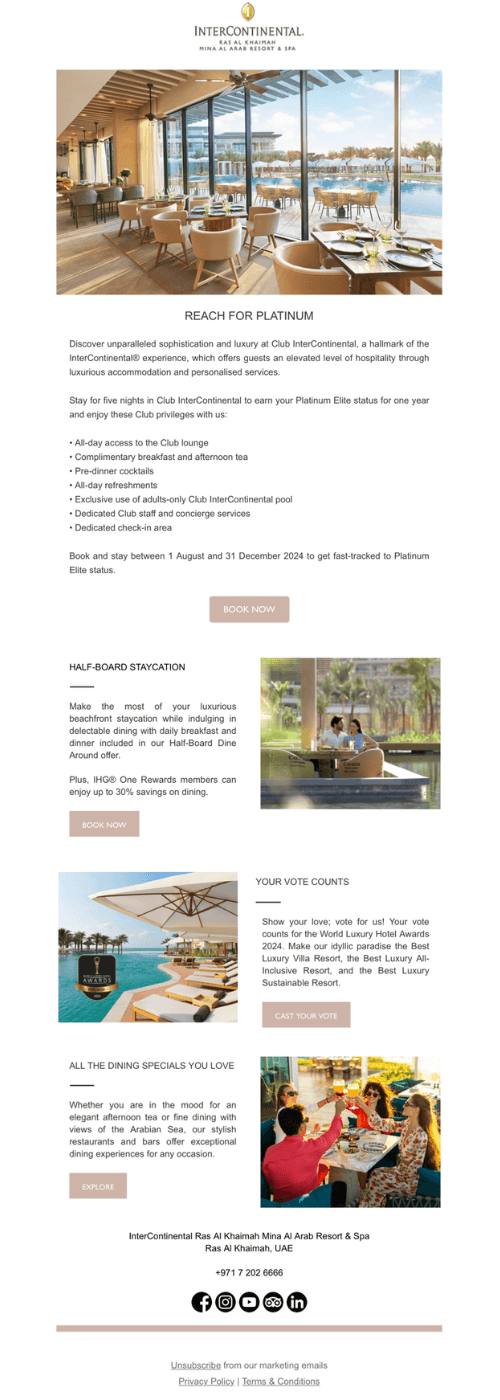Skip the guesswork with a first-party data strategy
Skip the guesswork with a first-party data strategy
Imagine waking up tomorrow to find that your hotel’s guest data has been wiped out. No more detailed booking histories, no more personalized preferences, and no more insights into your guests’ behaviors. Instead, you’re left relying on OTAs and third-party data providers who own the keys to your guests’ information — data that could’ve helped you increase guest loyalty, drive direct bookings, and improve your bottom line.
It’s a nightmare scenario for any hotelier, but the good news is you don’t have to let it happen. A first-party data strategy puts you back in control. By collecting and owning data directly from your guests, you unlock the power to create personalized experiences, save on commission fees, and protect your hotel’s future growth.
Instead of being at the mercy of external platforms or paying as much as $75 billion for data that doesn’t truly reflect your guests’ needs, take the first step and make a first-party data strategy your first choice. You’ll maintain control and gather insights directly from your guests to ensure every touchpoint is personalized, meaningful, and secure.
First-party data is not just a trend—it’s the future of the hospitality industry. Forget the uncertainty of relying on third parties. It’s time to build a “go-to” strategy that prioritizes your hotel’s success and keeps you closer to your guests than ever before.
Complete ownership of the guest experience
When you own your guest data, you own the entire guest experience – from inspiration and research to booking, stay, and even post-stay. Every interaction with your brand passes through your hands first.
And with a first-party data strategy you have that control and can eliminate the pitfalls that come with outsourcing your data.
Less siloed data
Here’s a reality check. Many hotels struggle with siloed data — disconnected information from multiple systems, platforms, and departments. Siloed data has a sneaky way of reducing team productivity and making it difficult to identify the right information to target the right guest.
It’s why some hoteliers finally give up on their messy data and turn towards a first-party data strategy. And hoteliers that use technology like Revinate’s Customer Data Platform guarantee centralized data, as this technology runs purely on first-party data.
When you bring all your guest data together — from website interactions to booking behavior to post-stay feedback — you create a unified view of each guest. Andrew Ladd, Vice President of Noble House Hotels & Resorts, details the power of a first-party data strategy on the Hotel Moment podcast, saying, “We’re not isolated to just the digital interaction. We have multiple opportunities within the customer journey to interact with the consumer and gain knowledge about them.”
When you lead with a first-party data strategy, you get direct access to your guests’ behavior and preferences. This means no more hunting for insights that may not be as actionable or specific to your property. You gather the data you need when you need it and use it to make decisions that matter.
More data security
81% of consumers have privacy concerns about their personal information. So, what does that mean, really?
Well, that means guests need to trust you before they give up something like their email address. As a hotelier, you’re in the business of building guest relationships, but you’re also in the business of building trust.
“Are you telling the consumer exactly what you’re doing with their information, and giving the option to opt out of it? I think that the first phase of trust building is really, really important and one that we as an industry – and all industries – are going to have to get a lot better at because consumers are getting a lot more savvy. They’re understanding how their data is being utilized. And frankly, if you don’t give them that option and you’re not at the forefront, they’re not going to give you their information.”
That’s Andrew again, highlighting data-savvy and privacy-concerned guests.
The truth is, the more data you share with third parties (and don’t even get us started on cookies), the more risk you place on your guest’s data. Hoteliers have enough on their plate with GDPR compliance, which is why relying on a first-party data strategy eases privacy concerns. By keeping guest data in-house, you minimize the chances of a security breach that could compromise both your guests’ privacy and your brand reputation. You manage how data is stored, processed, and protected.
As you build trust with your guests by demonstrating your commitment to their privacy and security, they’re more likely to return and share more data with you, creating a virtuous cycle of trust and loyalty.
Saves on hotel expenses and boosts direct bookings
“Many times people think just investing it in the third party is an easy win. Yes, it’s an easy win, but you’re not even seeing the amount that you’re spending in that commission on your P&L.”
That’s Kathleen Cullen, Executive Vice President at PTG Consulting talking on the Hotel Moment podcast about how hoteliers end up missing their most profitable opportunities and waste marketing dollars when investing in third parties and OTAs. Kathleen explains that the low hanging fruit to drive more commercial success for your hotel is found in how your hotel uses your technology to drive more direct bookings.
Kathleen goes on to say, “Direct bookings are critical. Many times we’re investing in the OTAs, for example, or third-party bookings, and we’re doing marketing through them. Why not invest those marketing dollars, those same dollars that you’re currently giving to third parties, and shift those — that investment into your own website, into your own direct booking strategy, into your own communication with the customer database that you do have?”
A first-party data strategy directly supports hoteliers’ initiative to drive more direct bookings. Fostering direct relationships with your guests is much more lucrative if you take a look at the math. But the point is, if you can encourage more direct bookings, you’ll retain more of your revenue while increasing your NOI, which is the ultimate determining factor of your hotel’s profitability.
Paying for third-party data or ad placements that don’t always lead to conversions is wasted money when you can target guests who are already familiar with your brand and interested in what you have to offer.
Makes personalization and segmentation simple
A key advantage of a first-party data strategy is its ability to fuel personalization and segmentation efforts with ease. Why? Because guests tell you what they want. They gave you the information – their stay speaks for itself – so using that information makes engaging with them again more intentional.
Take it from InterContinental Ras Al Khaimah Resort and Spa, which sent this segmented one-time campaign using first-party data that they had gathered on their guests who had stayed with them previously. That data generated confidence in their marketing efforts that these guests would likely take advantage of this exclusive offering.

This campaign is a perfect example of what Evan Crawford, VP of Marketing at Pyramid Global Hospitality, was describing on the Hotel Moment podcast when he said, “…The reservation process and those interactions through check-in, mobile registration, website opt-in – I think a key element to first-party data capture is lowering the bar for receiving it, …and then offering some sort of value to them in order for them to engage with us.”
Evan also mentions the voice channel as a prime opportunity to collect first-party data. It’s also a prime opportunity to apply that data and personalize phone conversations with prospective guests.
By integrating guest profiles and data from previous interactions, reservation agents can seamlessly personalize phone conversations to reengage cold leads to offer more relevant solutions and build stronger relationships. For example, when a returning guest calls, agents can reference their previous stay, ask if they’d like the same room, and suggest amenities or services they’ve enjoyed before.
That level of personalization, whether that’s via email or over the phone, is something OTAs just can’t replicate and is a major competitive advantage for properties.
The future is “first”
The future lies in first-party data. When you prioritize a first-party data strategy, you put your hotel in the driver’s seat. You own and control the guest experience at every stage of the journey – from securing more direct bookings, saving on OTA commissions, enhancing personalization, and improving guest loyalty. A first-party data strategy will define the future of hospitality. As you safeguard your business today, you’re setting yourself up for success in the years to come — growing stronger, more connected relationships with guests and ensuring your hotel remains competitive in an increasingly digital world.
Find out how to set up your first-party data strategy with the right technology.
Related Posts
This site is protected by reCAPTCHA and the Google Privacy Policy and Terms of Service apply. View our Terms & Conditions here. *Required fields.



